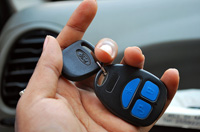2.- How to say it. Modal verbs for permission.
Citas Para Pensar
“It's easier to apologize than to ask for permission.”

In the previous unit we had a look at modal verb can/could/be able to, which can be used to express request, possibility, ability and permission. Now we look at other ways to ask for permission.
Can and Could are used to ask for permission.
- Can I use your car tonight, dad?
- Could I use your car tonight, dad?
There are differences between the two.
- Can is used in informal situations while Could is used in more formal, polite situations.
- Can I borrow your pencil, Tomas?
- Could I borrow your pen, Mr. Clapton?
- Can is used for the present and Could is used for the past.
- Last night I couldn't go to the disco; my father was really angry with me.
The use of May is very formal.
- May I use the telephone, please? Yes, you may.
Note that when we want to give permission, we use can or may, but not could.
Be allowed is used to express that we have permission to do something.
- We will be allowed to smoke in a bar when we are 18 years old.
- People over 55 years have been allowed to leave the building 30 minutes earlier.
Is there any difference between can and be allowed to?
Can is used for general permission while be allowed to refers to a particular occasion.
- People only can smoke in the staff room.
- The prisoner was allowed to leave the prison for one day last weekend.
Ejercicio Resuelto
Click to read the Spanish translation.
Think about it
Some common mistakes when using modal verbs are:
- They will can speak two languages.
- I can to dance very well.
Can you correct them?
A step ahead
Here you have video to revise the basics of modal verbs.